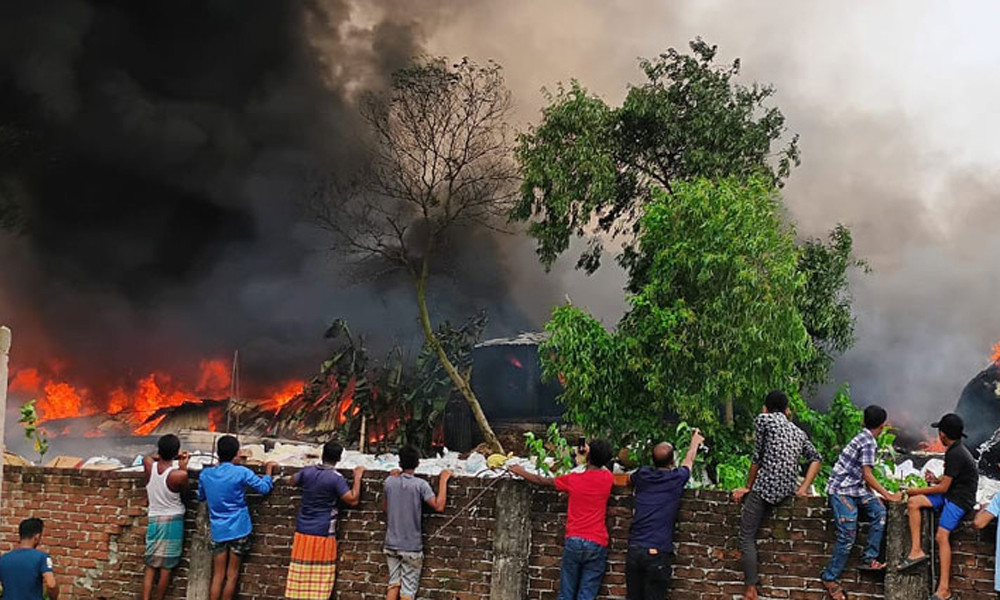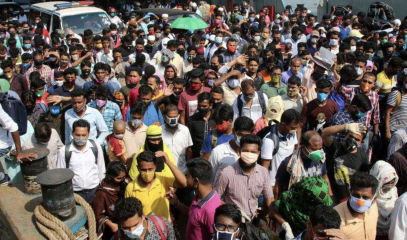Protests and factory closures mark garment industry crisis
Prime Minister Sheikh Hasina’s resignation set off the crisis. Workers are protesting over back wages and accuse factory owners, many of whom are linked to the previous government, of fuelling the unrest for political reasons. Source tells AsiaNews that unemployed young people are returning to their home villages. Exports for coming seasons are at risk.
Dhaka (AsiaNews) – Over the past two weeks, Bangladesh’s dissatisfied garment industry workers have increasingly turned to protests, culminating on Wednesday with a chemical warehouse set on fire in Kashimpur (Gazipur district).
The workers, who are protesting over back wages, prevented fire services from extinguishing the blaze at the Big-Boss factory, part of the Beximco Group, with plant assets reportedly looted.
Salman F Rahman, owner of the Beximco group and a former member of Parliament for Sheikh Hasina’s Awami League, is currently in custody. The former prime minister fled on 5 August after student protests demanding her resignation.
The unrest has led to the closure of 183 garment factories, including 54 in the Savar-Ashulia-Jirani area, and 12 in Gazipur. Many workers were laid off because of lack of work.
The garment industry, a mainstay of Bangladesh's exports, is at risk of considerable losses due to these disruptions, jeopardising international orders. Many fear that sales to foreign buyers will not be renewed for next season.
“Those who have no work, become depressed,” said Sister Rose, a missionary of the Immaculate who works with PIME Fathers in Bangladesh at a workers’ centre in Zirani, on the outskirts of Dhaka, speaking to AsiaNews.
“So many are moving back to their home villages,” she added. “Our hostel boys and girls are on ‘holiday’ since their companies are closed. Some of them are leaving for their home villages.”
The crisis was sparked by the change of government after the resignation of Prime Minister Sheikh Hasina, which enabled workers to voice their demands; the latter include attendance bonuses, meal allowances, increases in nightshift pay, wage adjustments, and lighter duties for pregnant workers.
Unions and the government are trying to find solutions to stabilise the sector, but political tensions complicate the situation.
Some accuse factory owners, many of whom are linked to the previous administration, of fuelling the unrest for political reasons.
Union leaders blame factory owners for the closures, saying that despite agreements between employers and workers, little action has followed.
Manjur Moin, Joint General Secretary of the Garment Workers Trade Union Centre, said that although a compromise was reached in a tripartite meeting, factories were closed without reason when workers returned.
Asif Mahmud Sajib Bhuiyan, adviser for labour, employment and youth sports in the caretaker government led by Muhammad Yunus, expressed hope that labour unrest will soon be brought under control.
“No worker would attack their factory because when it shuts down, it is the workers who suffer the most,” he said. However, he warned that the government will act against third parties who incite workers to cause unrest.
Bhuiyan also highlighted the seasonal nature of the garment industry, where products need to be ready for market three months in advance. In many cases, orders have been cancelled, with an estimated 15-20 per cent loss.
One factory owner who preferred to remain anonymous said that "the government must act responsibly and understand the mindset of the workers.” He urged the Directorate of Inspection of Factories and Establishments (DIFE) to solve the crisis.
Bangladesh is the second-largest clothing manufacturer in the world after China. It is estimated that over four million people, mostly women, are employed in this industry. In addition, more than two million people are involved in transportation related to this sector.
13/05/2013








.png)










